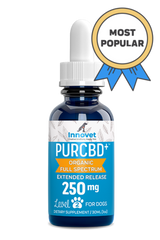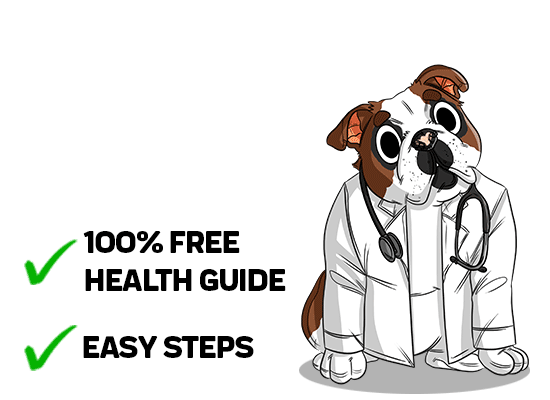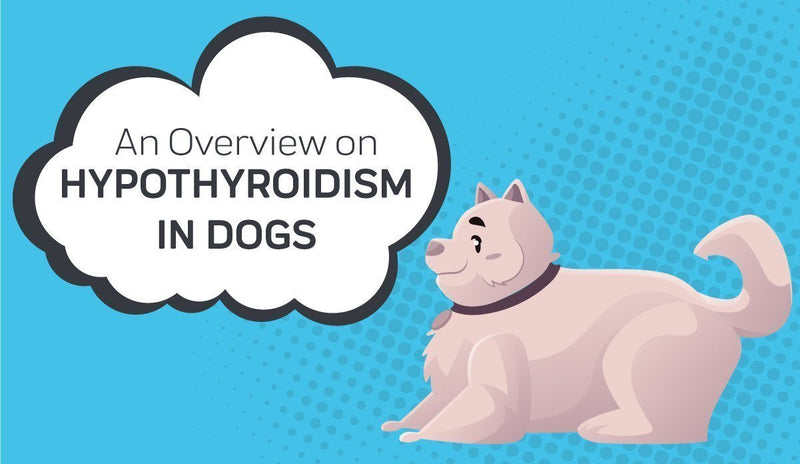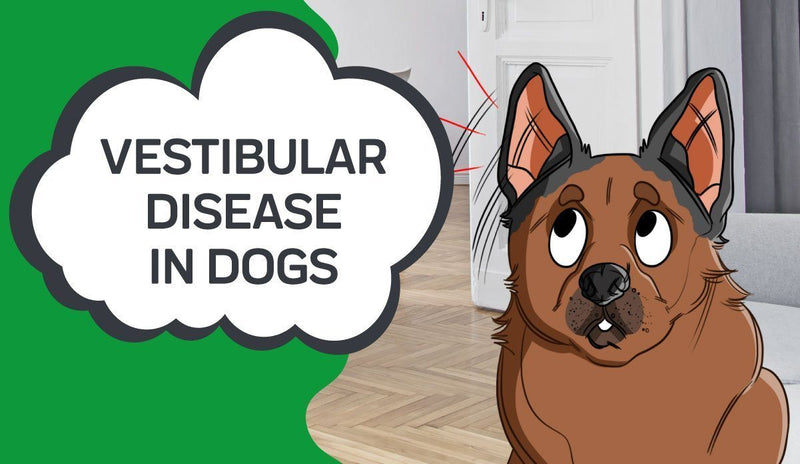- What is Inflammatory Bowel Disease (IBD) in Dogs
- What Causes IBD in Dogs?
- Which dogs get IBD?
- Diagnosing Inflammatory Bowel Disease
- Treatment Options for Inflammatory Bowel Disease in Dogs
- What do you feed a dog with IBD?
- Preventing the Development of Inflammatory Bowel Disease
- How CBD Oil Helps IBD

IBD is a chronic enteropathy that can cause vomiting and diarrhea in dogs and cats. The term IBD refers to the many conditions characterized by inflammation of the gastrointestinal tract such as food-responsive, antibiotic responsive, steroid response cases, or those who are immune suppressed.
The small intestine, large intestines, or both can be affected by the disease. Lymphocytes and plasmacytes are two of the most common cells found in this area; eosinophils, macrophages and neutrophils show up less often than that but on occasion they will too.
IBD in dogs can make life painful and dangerous for your dog as well as very upsetting for you. Treatments can be stressful for both of you, and they can potentially make matters worse. Inflammatory Bowel disease (IBD) in dogs can be managed and prevented, depending on the cause, and CBD oil can help with both the managing and aid in preventing. Read on to inflammatory bowel disease in dogs and make life much better for you and your dog.
It is unknown exactly what causes IBD in dogs, but it may be triggered by various factors. It's been noted that many healthy dogs and cats are exposed to the same triggers as those with IBD but never develop symptoms of illness. We'll take a closer look at these potential contributing influences on gut inflammation in this article before discussing diagnostics, treatment options, and outcomes-based off recent studies done in light of the latest research available.
What is Inflammatory Bowel Disease (IBD) in Dogs
Inflammatory bowel disease, or IBD, is an overgrowth of inflammatory cells in the bowel. This can be caused by several gastrointestinal diseases.
It is a serious illness, potentially resulting in malabsorption, chronic vomiting, diarrhea, blood or mucus in stools, gas, excessive abdominal sounds, and less often, loss of appetite, weight loss, depressed mood, and fever.
The condition may vary from better to worse to better over time, a sort of ebb and flow. So, don't rule it out or delay treatment just because it's not constant.
Not IBS
IBS, irritable bowel syndrome, is largely a human condition. It shares symptoms with IBD, so it is understandable to be confused, but the cause is different. IBS is a mental condition that affects the digestive system and does not involve inflammation. IBD is a physical disease at the root.
Colitis in Dogs
Colitis is a common intestinal disease in dogs that consists of inflammation of the intestines and/or colon.
Its primary symptom is frequent, watery stools. The dog will likely seem to need to go very badly and need to go often. They will likely strain to go. It is not uncommon for there to be blood, mucus, or fat in the feces. Vomiting is less common, but not unusual. Weight loss doesn't normally occur.
Thankfully, the prognosis for colitis is very good.
Gastritis in Dogs
Gastritis is inflammation of the stomach, and it may be acute or chronic.
Symptoms include vomiting, loss of appetite, abdominal pain, dehydration, increased thirst, lethargy, depression, blood in the vomit, blood in the feces, and/or weight loss.
Acute varieties may heal themselves. Chronic conditions fair better or worse depending on the cause.
Enteritis in Dogs
Enteritis is inflammation of the small intestine that may be caused by parasites, allergies, bacteria, or viruses. Symptoms include vomiting, diarrhea, weight loss, lethargy, abdominal pain, fever, dehydration, and tarry stools.
Treatment depends on the cause and severity of the condition. They may be treated for dehydration and/or given anti-diarrhea medications. Food may be withheld for a short time and then slowly reintroduced.
What Causes IBD in Dogs?

If your dog shows symptoms of inflammatory bowel disease, prepare to answer certain questions for the vet. They will want to know about the dog's diet, allergies, potential exposure to toxins, medications, signs the dog has a weakened immune system and the dog's stress level. Vets are not 100% sure what all causes inflammatory bowel disease, but research and experience connect it to problems with the immune system along with exposure to threats such as bacteria, mold, fungi, parasites, toxins, antibiotics, and substances the dog is allergic to. It can also be genetic. Stress is a factor.
Sometimes injuries and swallowing foreign objects can cause inflammatory bowel disease in dogs. Be sure to tell the vet if you are aware of either of these things happening, or there is reason to think it likely it did, such as a toy is missing.
Dogs can get enteritis after having radiation treatments. It would be considerate of the licensed vet to give you a heads up about that potential while giving the radiation treatments.
Which dogs get IBD?
Any dog can get IBD, but some dogs are more prone to developing it than others.
The risk increases with age, and middle-aged and senior dogs develop the condition most frequently.
Some breeds are genetically more disposed to get it: Basenjis, French Bulldogs, Irish Setters, and Lundehunds.
Dogs with a weakened immune system and/or high stress level have an increased chance of developing inflammatory bowel disease.
None of these things means a dog is guaranteed to get inflammatory bowel disease, just that they are more likely to than your average dog, and taking precautions could ward it off.
Diagnosing Inflammatory Bowel Disease
IBD in dogs is a difficult disease to diagnose. It can't be diagnosed on physical examination, history, fecal checks or radiographs and it's absolutely necessary for these tests to rule out other diseases that may present with similar clinical signs like parasitic infections in the gut, intestinal foreign bodies (e.g., swallowed objects), liver disease or kidney problems among others - not forgetting cancer which might also cause IBD-like symptoms.
Dogs diagnosed with IBD severely may be experiencing protein loss through their intestines. This can lead to the dog's body becoming rundown and a long-term prognosis of death being even more likely than before when combined with other factors, such as low blood proteins levels. An Intestinal Biopsy will ultimately be necessary for diagnosis which typically includes an endoscopy or surgical biopsy depending on the severity of symptoms from the patient history.
After examining the biopsy samples, your pet's pathologist will confirm whether or not canine IBD is present in their body. This information can help tell you how to plan for treatment and get an idea of what may lie ahead.
Treatment Options for Inflammatory Bowel Disease in Dogs
Treatment options vary depending on the cause of IBD in dogs.
Parasites and infections could be treated directly, and the symptoms of the disease should subside. Anti-parasitic or antibiotic medications may be given. Probiotics are a natural way to treat bacterial overgrowth infections and may be good for dogs with a mild case or who can't use other treatment options. Anti-inflammatory CBD oil might work for both parasites infections, but consult your licensed vet about trying it and be prepared to take a more aggressive approach if the dog doesn't rapidly improve.
Depending on how sick the dog is, they may need additional help treating the symptoms while the cause is eradicated. A very dehydrated dog may need to stay with the vet to get rehydrated or they may be given anti-diarrheal medications to reduce this symptom while the gi tract inflammation and the cause of it are addressed.
If a dog has had IBD, it can easily come back or may never fully go away, but it can usually be managed so the dog can live a normal life. Most dogs live a long and relatively rich life after being treated for IBD. They should be treated early though to ensure their health doesn't decline so much that an individual bout of dehydration, weight loss, nutrient deficiency, or infection kills them or causes permanent damage. You also need to know the cause in case there is an underlying condition that needs to be treated, such as an infection of some kind.
For mild cases, and/or ones that seem to be caused by food allergies, the vet may start the dog on a special diet as the only treatment. They may recommend a certain store-bought or homemade dog food. The best dog food for IBD will be part of a hypoallergenic, low-reside, or a high-fiber diet. It may take eight to twelve weeks to see results.
Sometimes anti-inflammatory drugs are given, but vets try to limit their use because they have considerable side effects which can exacerbate symptoms of the disease, such as diarrhea, or cause ulcers, kidney disease, liver disease, or death.
Because the dog's Gi tract is inflamed due to an immune response, vets may suggest for the most serious cases that the dog take immunosuppressive drugs. This of course, will be weighed out by the concerns of your dog running around with a suppressed immune system.
A bit of trial and error may be necessary to determine what treatment works for your dog. It may take several treatments used in tandem to get the IBD under control.
What do you feed a dog with IBD?
Dog's diet can affect its life expectancy; it has been observed that people who adopt some form of raw or home-cooked diet are more likely to live longer than those on commercial diets, as they tend not only include higher levels of essential fats but also provide an adequate intake of micronutrients such as antioxidants – which prevent cells being damaged by free radicals - and prebiotics (i.e., organisms including bacteria) whose presence promotes healthy gut flora balance throughout the large and small intestine.
Dog food with a high protein content is best for recovering from IBD. In recent years, many pet owners have been making the switch to organic dog foods due to their quality ingredients and lack of additives that may cause irritation in dogs suffering from this condition.
Preventing the Development of Inflammatory Bowel Disease
It may be possible to prevent IBD in dogs by eliminating potential causes. Using fewer cleaning chemicals and pesticides can reduce their contact with toxins, checking their diet for potential allergens and toxins also limits contact, and helping your dog maintain a strong immune system and lower stress level will make them better able to fight off triggers.
How CBD Oil Helps IBD
CBD oil can help dogs manage their IBD when no traditional treatment methods help them or can be used. It makes a great addition to help a dog deal with the side effects of medications.
CBD, or cannabidiol, is a chemical extracted from the hemp plant that boasts similar results to medical marijuana. It has not been as widely tested as marijuana, but it is showing great promise at not only doing the same things but doing them better. You see, marijuana has cannabidiol in it, but it also has a lot of THC, the "high" causing chemical, and it can make one feel powerfully better, but often in the short term and can leave the user with a crash. Cannabidiol doesn't do that. It is more of a subtle enhancer for the body's own natural functions and as a natural anti-inflammatory.
This works because humans and dogs have an endocannabinoid system that makes its own cannabinoids. Yes, right now, you and Fido are generating your own cannabinoids, and their balance plays a huge role in your health and well-being. These cannabinoids are not always functioning as they should, and external cannabinoids like CBD can boost their functionality.
CBD boasts a staggering number of health benefits, but here are the ones for IBD:
- powerful anti-inflammatory properties
- maintaining a healthy appetite
- relieving stress
- alleviating pain
- supporting a healthy immune system
- promoting healthy bowel movements
- providing additional nutrients
As you might have noticed, CBD's list of benefits may tackle inflammatory bowel disease both where it begins, how it works, and in what it causes.
For the dogs that must take these medications, CBD can also help reduce the side effects from traditional medications, side effects that make them feel weak, have a poor appetite, suffer depressed mood, have diarrhea, and suffer a weakened immune system. These side effects may reduce their quality of life or threaten their ability to keep taking the medication. Giving your dog CBD oil before they are diagnosed with inflammatory bowel disease could even prevent them from ever getting it. CBD oil treats may also help with reducing stress or improving the immune system in a more palatable form for your pup. And it's natural with hardly any side effects. If you give a dog an excessive amount of CBD, they may become sedated or experience loss of appetite and diarrhea. That's it. Granted, you don't want to exacerbate their diarrhea, but that doesn't happen with regular dosing. And it's a far less scary list of side effects than what comes with most of the prescription medications they can take. You know they're scary when doctors wait until the most serious cases to give them.
Sources:
Therapeutic Use of Cannabis in Inflammatory Bowel Disease
Inflammatory Bowel Disease in Dogs and Cats
CBD May Support Treating Inflammation
Approved by:
Dr. Sara Ochoa
Doctor of Veterinary Medicine, St. Georges University

Thanks for stopping by!
P.S. We Love You!
Sincerely,
The Innovet Team
Please do not ask for emergency or specific medical questions about your pets in the comments. Innovet Pet Products is unable to provide you with specific medical advice or counseling. A detailed physical exam, patient history, and an established veterinarian are required to provide specific medical advice. If you are worried that your pet requires emergency attention or if you have specific medical questions related to your pet’s current or chronic health conditions, please contact or visit your local/preferred veterinarian, an animal-specific poison control hotline, or your local emergency veterinary care center.
Please share your experiences and stories, your opinions and feedback about this blog, or what you've learned that you'd like to share with others.
LEARN MORE
Best Selling














 CBD Oil for Dogs
CBD Oil for Dogs Advanced Mobility Support Chews for Dogs
Advanced Mobility Support Chews for Dogs All Natural Oatmeal & Honey Shampoo + Conditioner for Dogs
All Natural Oatmeal & Honey Shampoo + Conditioner for Dogs CBD Dog Treats
CBD Dog Treats




